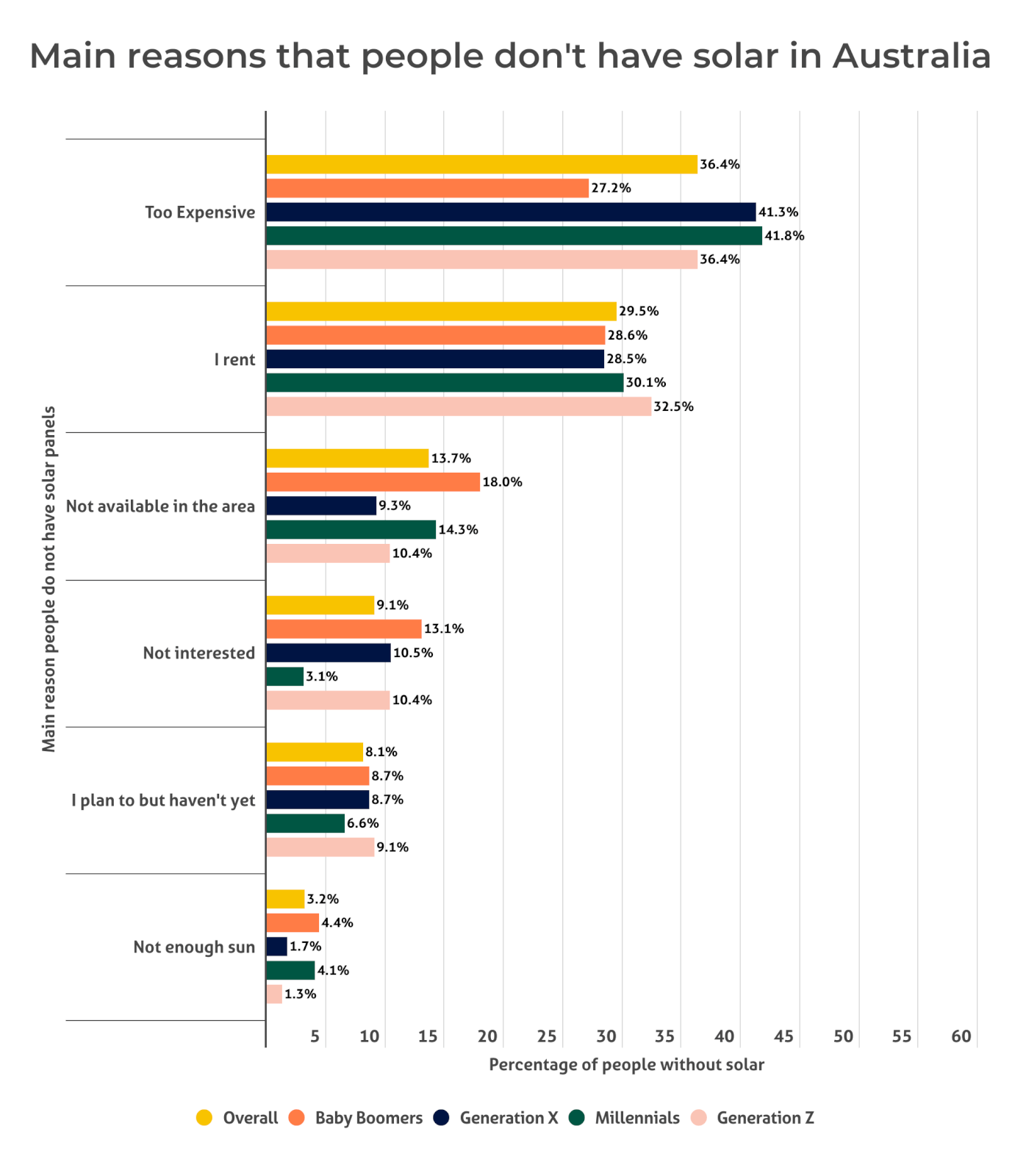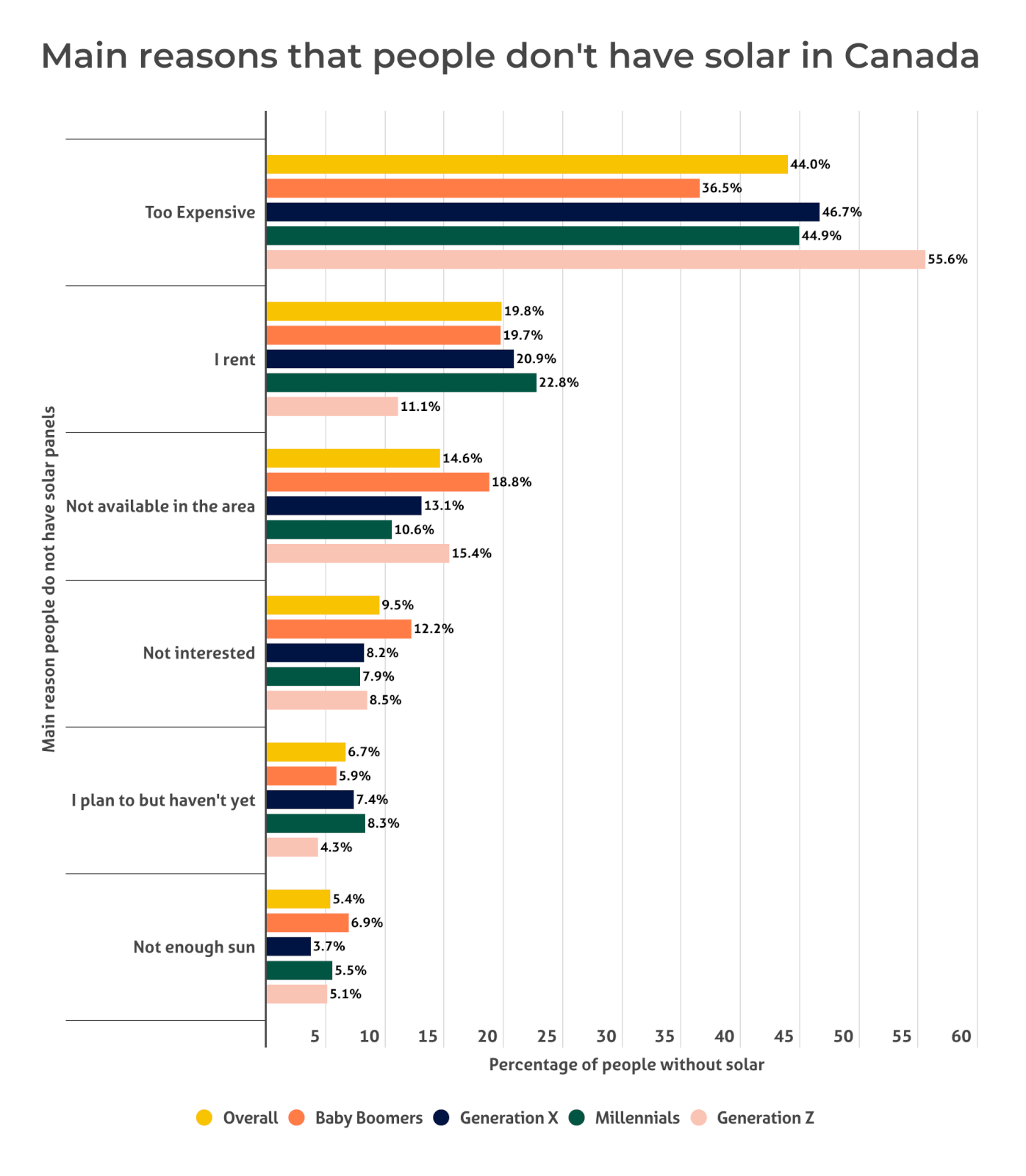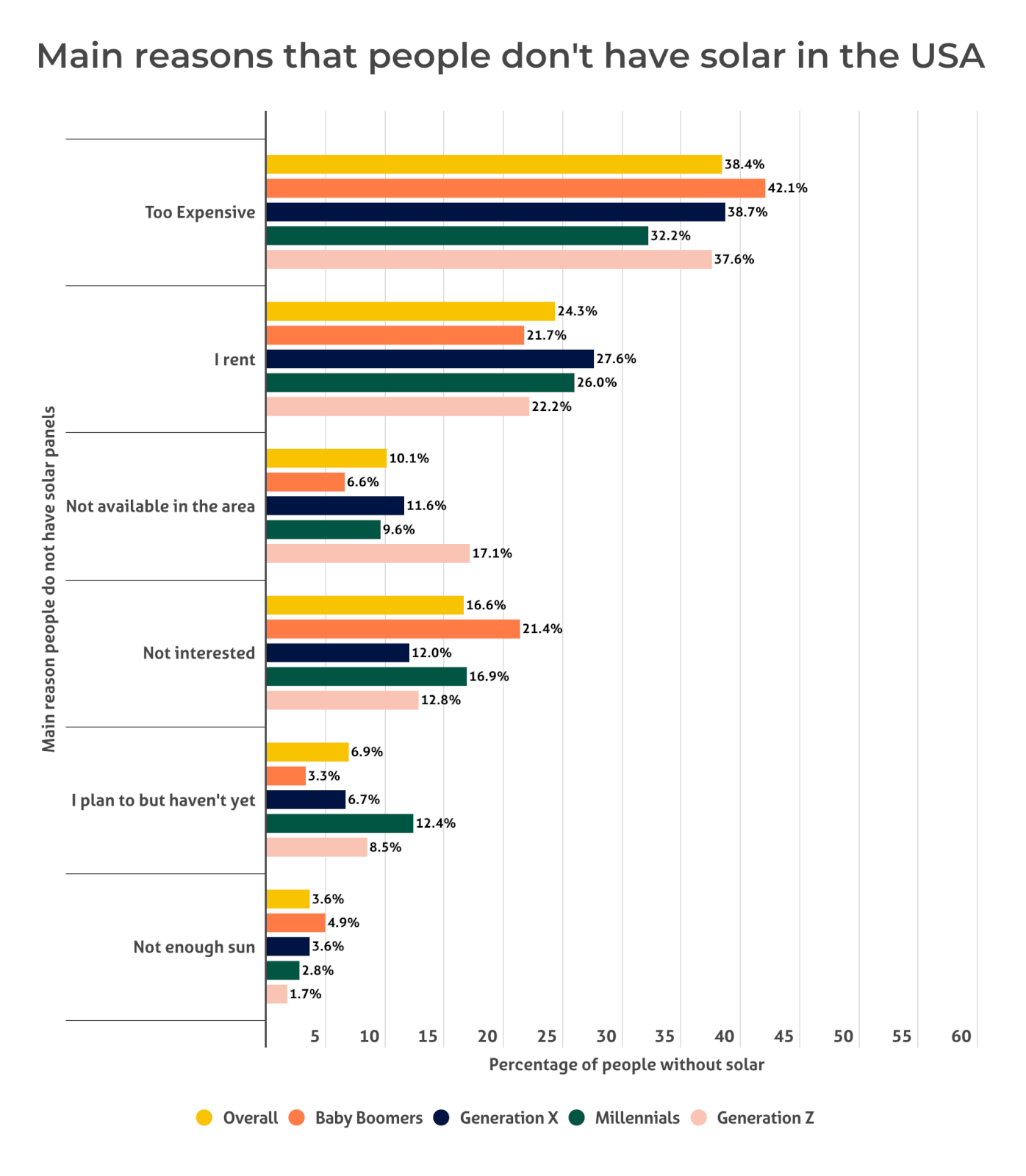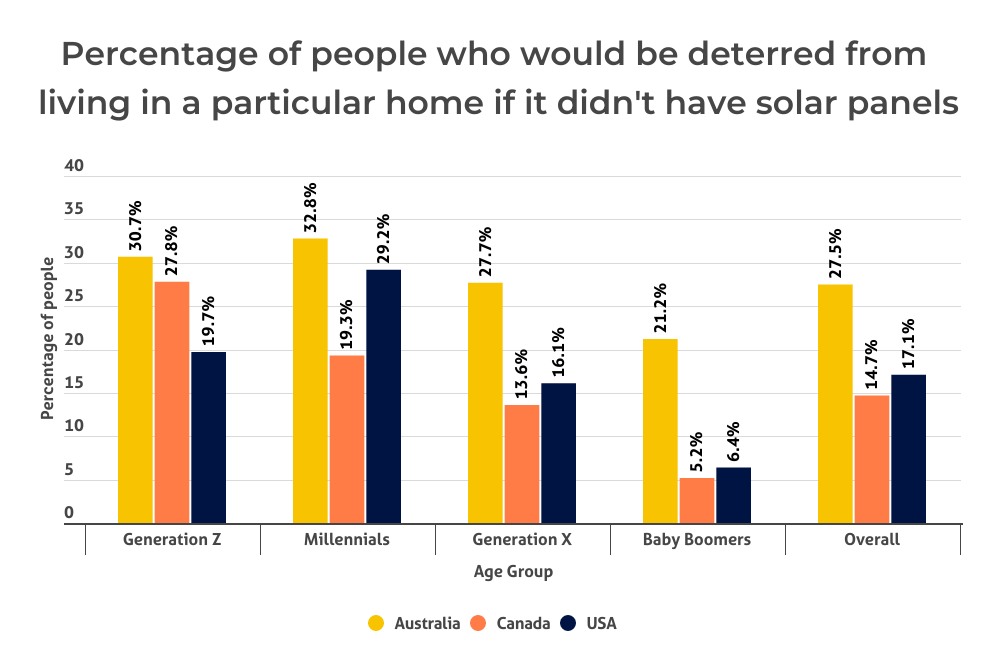The Burrow


Australia has a proud history of solar panel innovation. In fact, it was an Australian – Professor Martin Green – who first invented PERC (passivated emitter and rear cell) technology, which is now used in the majority of solar panels manufactured today.1
Since then, solar panels have seen enormous reductions in cost and dramatic increases in efficiency, and have become viable for many small-scale, residential applications.
So, as experts in energy, we wanted to find out the current state of rooftop solar adoption, public opinion, and some of the primary factors still preventing people from installing solar on their homes.
To this end, we polled over 3,000 Australians, Canadians and Americans to find out who’s warmed up to residential solar the most.
Here’s what we found out.

Of the three countries surveyed, Aussies were the most likely to have solar panels installed on their homes (34.9% reported having solar). In fact, they were almost twice as likely as Americans (17.8%) and more than four times as likely as Canadians (8.2%)!
Across all three nations and age brackets, renters were consistently less likely than homeowners to have solar panels installed at their residence.
One potential reason for this is that landlords may not have as much incentive to install solar panels on properties for lease, as they are not necessarily the ones paying the electricity bill for that property.
Interestingly, when breaking down the data by age group, Generation Z is the most likely to have solar at their residence in both Australia and Canada, however in the Unites States, Millennials proved significantly more likely than any other age group.
In fact, American Millennial homeowners and Aussie Gen Z homeowners were the two most likely groups to have solar – reporting at 53.2% and 53.6% respectively!

| Residential solar take-up in Australia | |||
| Age | Renters | Homeowners | Total |
| Generation Z | 30.5% | 53.6% | 39.4% |
| Millennials | 11.7% | 44.7% | 32.4% |
| Generation X | 10.1% | 47.4% | 35.6% |
| Baby Boomers | 8.5% | 43.5% | 34.8% |
| Overall | 14.1% | 45.4% | 34.9% |

| Residential solar take-up in Canada | |||
| Age | Renters | Homeowners | Total |
| Generation Z | 19.6% | 26.8% | 18.8% |
| Millennials | 2.6% | 21.8% | 12.4% |
| Generation X | 4.1% | 6.4% | 5.4% |
| Baby Boomers | 0.0% | 2.4% | 1.6% |
| Overall | 4.9% | 10.6% | 8.2% |

| Residential solar take-up in the USA | |||
| Age | Renters | Homeowners | Total |
| Generation Z | 10.9% | 25.8% | 14.6% |
| Millennials | 12.5% | 53.2% | 37.0% |
| Generation X | 2.8% | 19.7% | 11.4% |
| Baby Boomers | 5.7% | 8.7% | 7.6% |
| Overall | 7.5% | 25.0% | 17.8% |

Apart from being better for the environment, having solar panels installed on your home is meant to help reduce your electricity bill and save you money in the long term.
When asked if they had seen a reduction in their quarterly electricity bill, 72.8% of Australians, 52.4% of Canadians and 66.3% of Americans claimed they had.
When we asked if people thought having solar panels was worthwhile, the answer was even more unanimous – 91.5% of people across all three countries claimed that having solar panels was worthwhile, even though not all of them had seen a reduction in bills.
For those that said they did see a reduction in electricity bills, each nation claimed to have seen a reduction of just over $200 per quarter (or every three months) in their local currency, on average.
Australians claimed to have seen average savings of AU$209.93 per quarter (every three months) since installing solar panels. Similarly, Canadians said they saved CA$204.59 and Americans claimed savings of US$202.97, on average.

Of the respondents who didn’t already have solar installed on their homes, just under half of people said they wanted them (44.4%). Americans were the least likely to want solar panels if they didn’t already have them at 39.0%, compared to 49.0% of Aussies and 46.0% of Canadians.
So what are the main reasons that people don’t have solar? Perhaps unsurprisingly, across all three nations the biggest reason overall was cost, while the second biggest reason was people renting – so getting solar is not up to them.



Interestingly, when we asked if people would be deterred from living in a particular home if it did not have solar panels, almost 20% of people said that they would only want to live in a home if it had solar.
Australians were more passionate overall than Canadians or Americans about living in a home with solar. In general, concern for having solar decreases with age, although both Australian and American Gen Z-ers were less concerned than their Millennial counterparts.
Below shows what that data looks like broken down by country and age.


| Percentage of people who would be deterred from living in a particular home if it didn’t have solar panels | |||
| Age | Australia | Canada | USA |
| Generation Z | 30.7% | 27.8% | 19.7% |
| Millennials | 32.8% | 19.3% | 29.2% |
| Generation X | 27.7% | 13.6% | 16.1% |
| Baby Boomers | 21.2% | 5.2% | 6.4% |
| Total | 27.5% | 14.7% | 17.1% |

Compare the Market’s Head of Energy, Meredith O’Brien said solar panels are a good way to help lower your electricity bills while reducing your reliance on fossil fuels.
“That includes both large scale solar projects as well as rooftop installations.
“If you are able, installing rooftop solar on your home could save you money over the long term by reducing your electricity bills, while at the same time lowering your carbon footprint,” Ms O’Brien explained.
“In some cases, if you produce more energy than you consume, you can even sell that excess energy back to the grid for a bill credit in Australia.”
Ms O’Brien said there are also other ways to save on your electricity bill if you can’t install solar panels on your home.
“Even if you don’t have solar panels, you can still save money on your bills by paying attention to energy efficiency ratings when buying appliances, turning off lights and appliances when not in use and even insulating your home with the clever use of furnishings, curtains and draught stoppers.”
If you live in Australia, you could also try using our free online tool to compare energy plans and see if there is a better deal out there for your personal circumstances.
Compare the Market commissioned PureProfile to survey 1,000 Australian, 1,001 American and 1,001 Canadians adults in July 2023.
The survey asked people to describe their living situation. For simplicity, the results for homeowners with and without mortgages were combined, and the respondents living with friends and family were excluded from comparison due to a low sample size (but were still included in totals calculations).
When calculating the amount of money people saved after getting solar panels, responses above $1,000 local currency were excluded as they were considered outliers.
The various generations correspond to the following age groups:
